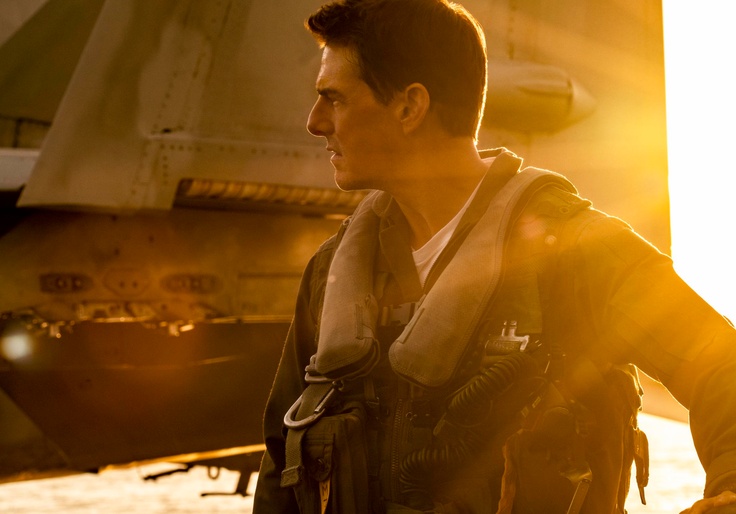There's a scene in the middle of Top Gun: Maverick in which Tom Cruise sits down with Val Kilmer, his adversary from the first Top Gun, released 36 years ago. Kilmer's Iceman was easily the most interesting character from the original—a brilliant and arrogant pilot properly suspicious of and yet attracted to the extreme recklessness of Cruise's Maverick.
In the decades since, Top Gun: Maverick tells us, Iceman has risen through the ranks of the Navy to become commander of the Pacific fleet. Maverick has remained an imprudent bureaucratic player who has never risen above the rank of Captain. Maverick is so impossible to discipline that he has only been able to remain in the Navy because of the protection of his old sparring partner—who, we learn from a series of offhanded text messages that suggest an entirely easy intimacy, has in the passage of time become his dearest friend.
Iceman summons Maverick to his house. His wife tells Maverick he finds it all but impossible to speak. Ice is dying of cancer. This plot development will not come as a surprise to anyone who has seen Val, the extraordinary 2021 documentary about Kilmer. He might have been the most talented actor of their generation but (oddly like Maverick) was a difficult character and saw his once-stratospheric career stall before he was tragically stricken with a virulent form of throat cancer that led to a tracheostomy.
Iceman and Maverick sit across from each other. Kilmer is no longer the beautiful young man of Top Gun. His face is round and shows every day of his 62 years—in sharp contrast to the ageless Cruise, whose Dorian Gray painting must be the chief adornment of Scientology's Sea Org headquarters.
Iceman types and words appear on a large computer screen: "I want to talk about work."
Maverick confesses he doesn't know how to handle the job he's been handed, in part because he's now supervising Rooster (Miles Teller), the resentful son of his late friend Goose. He had promised Goose's mother to keep him from dying in a plane the way his father did, and he has interfered with Rooster's career to protect his godson.
"It's time to let go," Iceman types. The two men look at each other. Not much else happens. Iceman says a few painful words, and cracks a joke about which of them is the better pilot. And then they hug. We are witnessing the passage of time, and time's ravages, in a very real sense here.
And, dear God, am I crying? Am I crying during Top Gun: Maverick?
I am.
Top Gun: Maverick is the sequel to what may be the iconic American movie of the 1980s. This is both a good and a bad thing. I just watched it again, and I honestly could not tell whether it was the actual Top Gun or a letter-perfect parody of Top Gun. It's false and wooden, on the one hand, and as brilliant a work of commercial mythologizing as Hollywood has ever created. You can't believe a movie as bad as this is also as good as it is. It's compulsively entertaining even as your eyes are rolling into the top of your head and trying to escape from your cranium into the upper atmosphere.
So what's interesting about Top Gun: Maverick is how good it is without being bad. For one thing, when Maverick gets called onto the carpet by superior officers telling him he's garbage, those superior officers are played by Ed Harris and Jon Hamm, who are infinitely better than James Tolkan and whoever else yelled at him in the original. For another, Cruise's love interest isn’t an absurd astrophysicist played horribly by Kelly McGillis but an amused and been-there-done-that bar owner—the terrifically appealing Jennifer Connelly, who has, like Cruise, maintained a level of beauty into her 50s that seems almost supernatural. And the intergenerational conflict between Cruise and Teller (who reminds us here as he does in the Paramount Plus series The Offer that he is one hell of an actor) is actually believable, as opposed to the ridiculous "Maverick has unresolved issues with his dead father, who died a hero but was made to look like a failure for reasons that are classified" plot point in Top Gun. Teller's conflict with this movie's version of Iceman, a cocky SOB called Hangman (the superb Glen Powell), burrs into your skin in a way the earlier conflict did not.
Finally, while Top Gun was basically a school movie—Maverick and Ice and the others are all training to be pilots at the Navy Fighter Weapons School and they compete like they are trying to make the crew team—this new one is an out-and-out war movie. Maverick returns to Top Gun as an instructor, only this time the 12 people he's teaching are all top naval pilots and weapons officers who have long since graduated from Top Gun. The deadly serious mission is to destroy a uranium enrichment facility in an "enemy" country (though at one point I thought I heard someone say "Iran") protected by surface-to-air missiles and better fighter jets than America possesses.
The raid will require two teams of fighters in four planes under incredibly difficult circumstances, and they will have two-and-a-half minutes to do it before they find themselves in a dogfight with the enemy. The flying scenes here redefine the word spectacular. Director Joseph Kosinski makes you understand that piloting a fighter jet is an incredibly strenuous activity that pushes the human body to the physical breaking point and beyond. What we see here is exciting and nerve-wracking and, yes, unexpectedly moving in exactly the way the Maverick-Iceman scene is.
Top Gun: Maverick is a very good movie. If you don't like it, there's probably something wrong with you.
